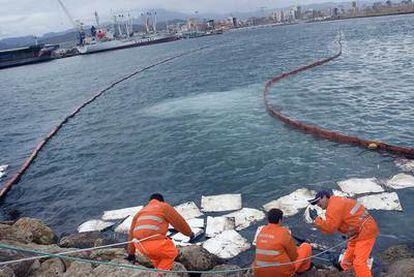Spain: no longer a place to dump waste
The practice of ships discharging fuel into the sea has dropped by 30 percent
Although Spain is a newcomer to European environmental policies, there is a feeling of contained euphoria among the judicial and administrative agencies in charge of fighting marine pollution on our coasts.
"We are beginning to crack the impunity with which many boats emptied out their tanks and bilges as soon as they reached our waters," says the prosecutor in charge of environmental affairs, Antonio Vercher. "We finally shook off that combination of helplessness and fatalism that pervaded our struggle against marine pollution until now." The sentence that used to appear in Merchant Marine reports ? "as usual, they 'bilged' us as soon as they left French waters" ? has been replaced with talk of arrests, identifications and fines.
"The practice of discharging waste is so widespread that our people used to think it could not be stopped, and that there was nothing we could do. Taken individually, these emissions are nothing major, especially in the Atlantic, where the sea is rougher, but taken as a whole they are a big problem," explains the chief executive of the Merchant Marine, Isabel Durántez. Over 350,000 vessels are in transit each year along the great European-African and European-American routes along the Spanish coasts. And 80 percent of non-accidental marine hydrocarbon pollution is caused by operational discharges.
Although it is still early to evaluate the efficiency of new control mechanisms, the European Maritime Safety Agency's satellite has registered a 30-percent drop in detected discharges. Many shipping companies, skippers and ship captains already know that Spanish coastlines have ceased to be the one region of Europe without surveillance where they could empty out their tanks with complete impunity. The number of disciplinary proceedings for marine pollution has increased considerably in recent years: from five completed procedures in 2000 to 33 eight years later.
Prosecutors, the chief executive of the Merchant Marine and harbor masters now have two powerful tools at their disposal. The first is the recent reform of the Penal Code, which stipulates criminal procedures against actions that pose a serious risk to "the life, health or integrity of people, or the quality of the air, soil, water, animals or plants." The reform took effect on December 22 and carries jail sentences of up to five years, which can be extended a further two-and-a-half for the worst offenders.
The National Marine Rescue Plan for 2010-2018 has made it an overarching goal to be "sufficiently severe" in its law enforcement to ensure that waste dumpers face the proper sanctions. Vercher considers that the implementation of the law implies the creation of a joint coordination framework between the prosecutor's office and police agencies.
The second tool is the addition of three aircraft to the marine rescue fleet, thus improving the agency's capacity to carry out surveillance work, detect waste discharge and obtain evidence.
"What we do is basically deterrence work. We often patrol at night because we know many offenders dump their waste then," says Commander Fernando Serrano, one of the most seasoned pilots in service. Serrano flies one of the three new Casa 235, which are equipped with cutting-edge technology such as sensors, lasers, and infrared and ultraviolet cameras that can capture nighttime discharges. Each of these aircraft costs 30 million euros. The cost of patrolling the coast by air is in the area of 50 million euros a year.
"The Casa 235 is an ideal plane for the work we do," says Serrano. "It can fly for nine hours, it has sensors that detect changes in water temperature, density and composition, as well as systems that let us scan and analyze liquids in the discharge area to use them as evidence."
In a recent four-hour patrol, Serrano figures his aircraft must have inspected some 40,000 square kilometers. In just two years, Spain has gone from being practically a non-entity in terms of territorial water surveillance (it only had two conventional planes) to working with the most sophisticated equipment. It has moved up from the blacklist of countries less involved in the battle against marine pollution to the list of members setting an example.
"The change came about after the Prestige disaster [an oil tanker that accidentally spilled thousands of metric tons of fuel oil along the Galician coast in 2002], which exposed our weaknesses. The government got into high gear then," adds Serrano.
Vercher, the environmental prosecutor, attributes much of the new policy's success to cooperation among European prosecutors. "We can say that Spain has finally taken effective charge of patrolling and controlling its own waters."











































